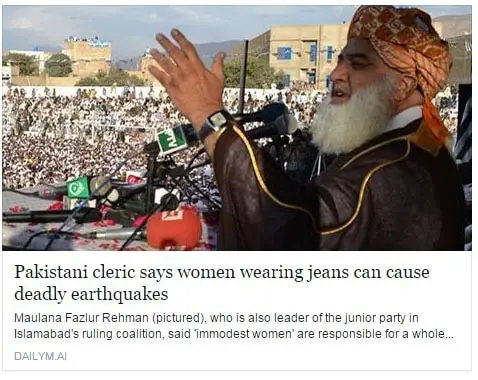Pakistani politician Chief Maulana Fazlur Rehman really believes in the power of a good pair of jeans, even going as far as attributing them to earthquakes and rising inflation. At least that’s what many mainstream media outlets reported this week.
Media have been reporting on a story that claims – during an interview – Reham blamed a flurry of things on women who choose to wear jeans, including earthquakes. But did it really happen? Pretty unlikely, since the original source to the story is a site that deals with satirical content, but this apparently hasn’t stopped many mainstream media reporting it as true.
The source, The Khabaristan Times, doesn’t often bother itself with real news, as evident by their tagline “telling it like it almost never is.” Which is probably a pretty good reason not to use them as a source when you’re in the business of reporting news that actually happened.
This fundamental lesson in journalism has been lost on many mainstream media outlets this week, including the New Indian Express and even the UK’s own The Daily Mail, who ran with the story.
Originally published on Pakistan Today back in February 2014, the piece was clearly marked as satire. The Khabaristan Times since republished the article on their own website in May 2015, causing it to be picked up by certain mainstream media.
Sponsored Content. Continued below...
The article claims that prominent Pakistani politician Fazlur Rehman went on a rant regarding women dressing immodestly, specifically picking out women who chose to wear jeans, assigning the blame for earthquakes squarely on their shoulders. According to the article, Rehman came up with all sorts of bizarre claims including…
And so there is a need to earmark and eliminate the real enemy of Pakistan: every woman who wears jeans.
According to the article, Rehman went on to blame the Balochistan crisis, energy shortfall and the deteriorating security situation upon the “immodest women” as well.
After mainstream media reported on the article and later realised it was fake, many scrambled to change their articles to point out the story was unverified and possibly satire. The Daily Mail embarked on their well-worn route of deleting the article and hoping nobody noticed.
They did (see below.)


A screenshot of the thumbnail for the now removed Daily Mail article was taken.
However a story like this that is picked by mainstream media is always going to go viral, even after the big players realise and rectify their mistakes. There are plenty of social media users still posting the story as true, and many smaller news sites still running with the original story.
There has been a substantial rise in satire sites recently, and many of these sites seem to focus on getting traffic as opposed to genuinely entertaining their audience with humour, leading us to dub them fauxtire websites.
Regardless of how you interpret the original article from The Khabaristan Times, what is clear is that some of the mainstream media journalists should have read our article on satirical and fauxtire websites and how to spot them, before they chose to run with this particular story.
Thanks for reading, we hope this article helped, but before you leave us for greener pastures, please help us out.
We're hoping to be totally ad-free by 2025 - after all, no one likes online adverts, and all they do is get in the way and slow everything down. But of course we still have fees and costs to pay, so please, please consider becoming a Facebook supporter! It costs only 0.99p (~$1.30) a month (you can stop at any time) and ensures we can still keep posting Cybersecurity themed content to help keep our communities safe and scam-free. You can subscribe here
Remember, we're active on social media - so follow us on Facebook, Bluesky, Instagram and X